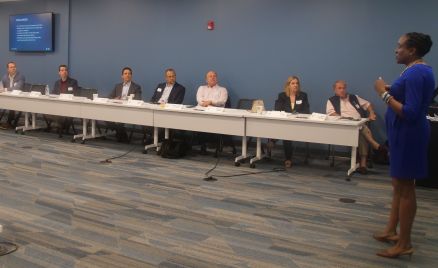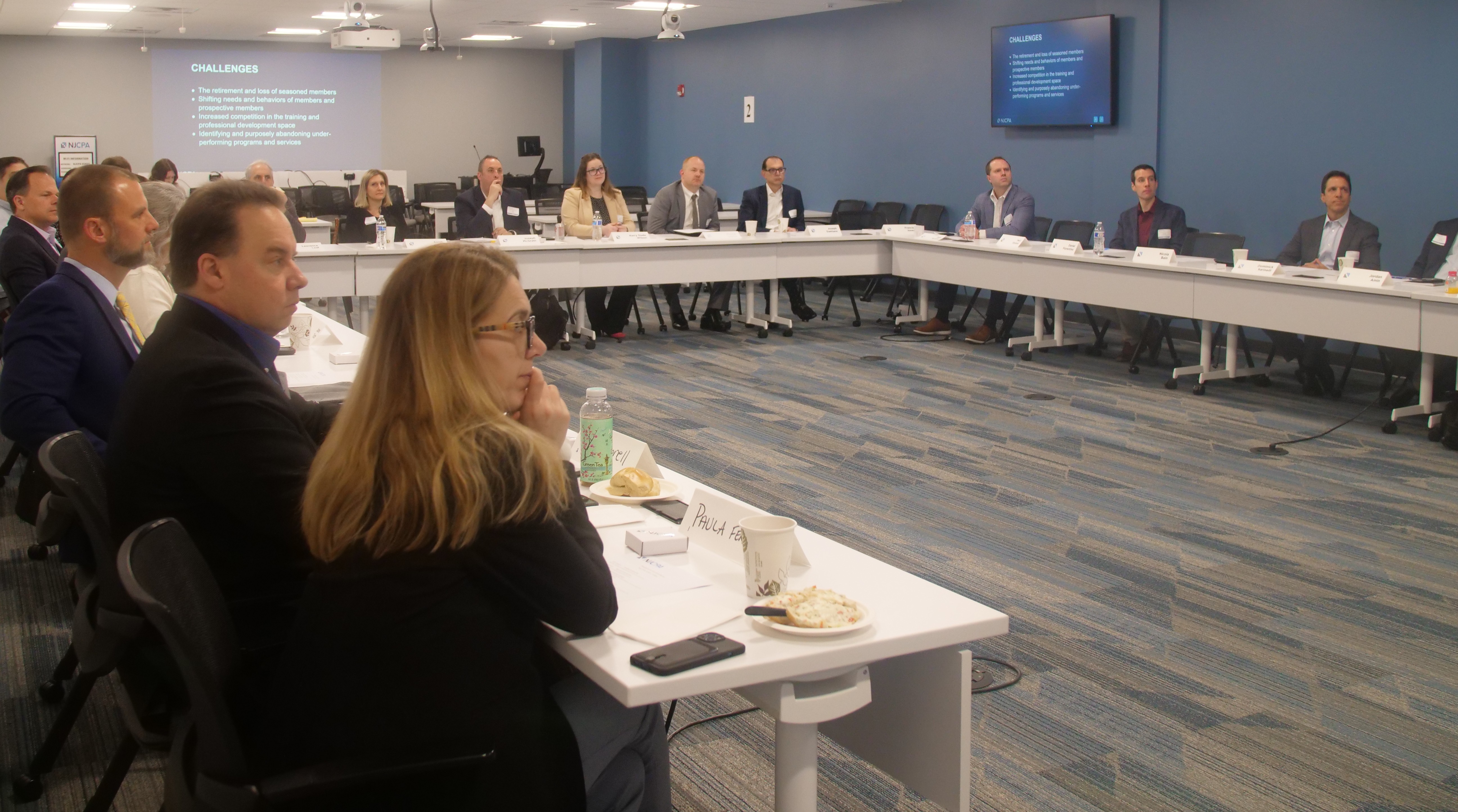Managing Partners Provide Key Takeaways in Four Growth Areas
by Kathleen Hoffelder, NJCPA Senior Content Editor –
May 15, 2025

The New Jersey Society of CPAs (NJCPA) welcomed 23 managing partners and/or their representatives at its Managing Partner Roundtable last week in Roseland — the first such meeting in its office since the COVID pandemic. Attendees discussed the current trends in the accounting profession and took a deep dive into the best hiring methods, ways to attract and retain employees, outsourcing efficiencies, artificial intelligence (AI) and professional development training.
Aiysha (AJ) Johnson, MA, IOM, CEO and executive director at the NJCPA, was on hand to provide a Professional Issues Update, reiterating the Society’s role in helping to build the pipeline and implement recommendations from its Pipeline Task Force, increase engagement and advance advocacy by partnering with business organizations, and building the political strength and brand of the NJCPA and its members. According to Johnson, “a strong NJCPA equals a strong profession and business community.”
She explained how the NJCPA is also steadfastly working towards an additional pathway to CPA licensure, which is making its way through the New Jersey legislature. “We hope it will enhance and provide more opportunities for those looking to enter the profession,” she said. “Advocacy has been a big focus of mine since I started here.”
Johnson also discussed how the New Jersey CPA Political Action Committee (NJ-CPA-PAC) continues to be a great resource for members and the profession as the nonpartisan organization works to ensure that issues important to CPAs and the business community are front and center with the New Jersey Legislature. “The PAC is how we protect our profession,” she added.
Takeaways to Grow the Profession
In idea breakout sessions, attendees elaborated on candid strategies for accounting firm success and shared case studies, challenges and what makes sense in the current regulatory landscape. Here are their takeaways in several key areas:

Talent/Training
- Decide whether to outsource to improve efficiency. India, for example, remains a viable talent resource, especially to reduce costs and gain efficiencies in tax and audit. Firms have invited Indian workers (obtained visas) to come to their U.S. operations during tax season or established an office presence in India to further control quality. Philippines is a newer area tapped for talent, but it is increasingly being utilized.
- Determine how to communicate outsourced functions. Engagement letters are a good place to explain this.
- Offer internships to help find talented staff at entry levels. Other staffing remains challenging for some firms.
- Continue to develop soft skills. These are important in working with clients and upper management.
- Send quarterly surveys to employees to help with morale. The “how are you doing?” survey can be used to connect with employees and discover challenges.
Business Transformation
- Understand that risk management and client expectations often present barriers to change.
- Discover how to balance specialized services and maintain efficient cost structures.
- Find out how to show value to clients. Change is expensive; it is a struggle to figure out how to best represent value.
- Learn which niche practice areas are experiencing growth. Real estate and outsourced CFO services, for example, are in demand.
Business Transformation
- Evaluate how best to work with clients. Firms discussed working towards being a "fiduciary to clients."
- Understand which hybrid work models work well. Firms are not mandating a five-day-a-week office presence. The New York metro area has a greater resistance to full-time in-person work but traffic may play a role./li>
- Showcase growth opportunities and training to entice staff to return to the office. This may work better than enforcing strict requirements.
- Know that "Friday is the new Saturday." Younger professionals should understand that managing partners are often accessible on a Friday in the office.
- Manage expectations of staff hired during COVID. Those hired during COVID are likely comfortable with more remote schedules versus those hired currently.
- Understand employee stock ownership plans (ESOPs) versus private equity. Determine when it’s best to pursue one versus the other.
Technology/AI
- Understand that prices for new technology keep going up. This is a harsh reality.
- Know that firms face challenges in driving adoption of AI tools and in recouping innovation costs.
- Be aware that AI is changing workflows. This is especially true for younger professionals.
- Know practical AI uses. AI is currently being used in building bots (automating) and with audits, engagement letters and back-office functions (some of which will go away with more AI use).